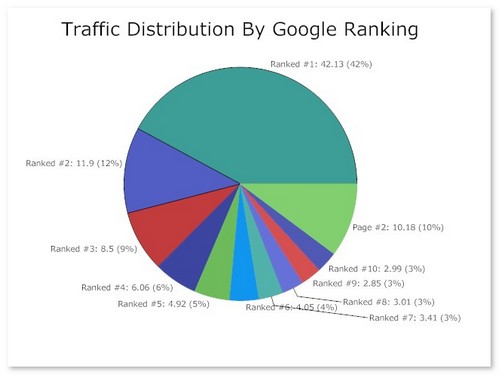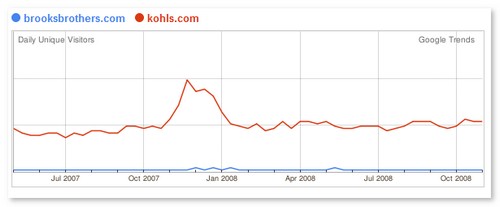
When you're pitching for SEO business, what objections do you hear most often?
Knowing what objections to expect, and how to handle them will help you win business. Here are nine common objections made by SEO clients, and a few ideas on how to deal with them.
1. Search Engines Will Find Us/We Already Rank
Sure. Under what keyword terms? How much of the site are the spiders missing?
There is a big difference between arbitrary ranking in search engine listings, and ranking for focused keyword terms. Demonstrate to the client the value of appearing under a wide variety of targeted keyword terms, as opposed to this being a random process. It is like the difference between advertising where few people are looking, as opposed to appearing on a string of billboards in prominent locations.
You could do a side by side comparison between the client and a more established competitor using Compete.com graphs. If they already rank for valuable terms, try to get them to track the business derived from those rankings, and show them the upside potential of increasing rank.

2. We'll Have To Redesign Our Site. That Costs Money
Quite possibly.
Try to demonstrate to the client that the potential benefits outweigh the costs. One way to price organic search traffic is to use the PPC prices as a guide. It could also be argued that organic listings have a higher trust level amongst users, making the traffic potentially even more valuable.
So how much is that poor design costing them in terms of lost opportunity?
3. SEO is Expensive
A common objection, usually made because the client can't determine the amount of work required, or the the value added.
Break down the work into separate tasks, and outline how long each task is likely to take. If the client knows your rate per hour, then they will be more able to determine if the cost is fair.
For example:
- Industry analysis - research industry sector, marketing and sales trends.
- Competition analysis - conduct review of competitor sites
- Keyword research - research keyword terms
- Site optimization, including title tags, meta tags, copy and internal linking
- Link building/directory submission/social media promotion
- Monitoring and reporting
Another aspect of this objection has to do with the value proposition. Again, try printing out the PPC bid prices for the same keyword traffic, and show how your work effectively undercuts that price. If you can, try and get information about how much the client spends on other channels, and do a side by side comparison of the relative merits, costs and benefits.
4. Upper management Won't Support It
Perhaps you need to be talking to the decision maker ;)
Ask what upper-managements objections would be? Sometimes this objection is legitimate, but it is often used to avoid having to tell you "no, thanks". The client cites an authority, who isn't present, implying that any further negotiations with the client will prove fruitless.
5. Why Should We Change The Way We Write Just For Search Engines?
This objection is commonly used by copywriters and journalists.
Established writers often use methodologies that don't take into account SEO. One way to get around this objection is to request a trail run on a few test pages. Once you're demonstrated that writing effective copy can result in an increase in visitors and conversions, you'll have more sway when it comes to changing the rest of the site.
Also, appeal to the copywriters vanity. If more people see their work, isn't that a good thing?
Cite "This Boring Headline Is Written for Google", an article about how The New York Times changed their writing practices to accommodate SEO.
"We're all struggling and experimenting with how news is presented in the future," said Larry Kramer, president of CBS Digital Media. "And there's nothing wrong with search engine optimization as long as it doesn't interfere with news judgment. It shouldn't, and it's up to us to make sure it doesn't. But it is a tool that is part of being effective in this medium."
6. SEO Doesn't Work. It's A Scam!
Ask the client why they feel this way. Has the client had dealings with SEOs in the past? Seen some bad press?
Have case studies on hand that demonstrate how you've solved search marketing problems in the past. Also provide recommendations from previous clients who were happy with your work.
Reframe the debate in terms of problems and solutions.
7. We Have A Strong Brand, So We Don't Need SEO
This is true, so long as people only search on the brand.
But what about those searchers who are searching for generic product/service names?
I once had this objection from a well-known childrens' clothes retailer. I ran a few search reports on generic searches, such as kids t-shirt, babywear, etc, and showed the client the traffic numbers. I then showed the client that their site wasn't appearing under any of those terms.
But her competitors were.
Why choose one or the other when you could easily have both?

8. We Like Flash. It's Cool!
Run away. Run fast..... ;)
Seriously though, such objections usually come from designers who place a lot of emphasis on site appearance, or want to play with the latest toys.
In the past, I've approached this in one of two ways. If they want to keep designing in Flash, or other technologies that make crawling and linking difficult, then suggest workarounds that don't affect the design. For example, create a print-friendly version of the site. This is the part of the site that gets crawled and seen by search engines and search visitors, while the designers can still focus on their elaborate designs. Essentially, you create a site within a site.
Show them that their competitors outrank them, in part, by using different technology. Is Flash really worth that competitive disadvantage?
From Google AdWords Blog:
Did you know that 20% of the queries Google receives each day are ones we haven’t seen in at least 90 days, if at all? With that kind of unpredictable search behavior, it's extremely difficult to create a keyword list that covers all relevant queries using only exact match."
It's even harder to capture that traffic using Flash.
BTW: Check out this example. Here is the spider's view of McDonalds.com.
9. Are SEO Services Really That Important?
Compared to.....?
It's an effort vs reward question. Again, if you can demonstrate clear commercial benefits over and above the cost, then "hell yes!". Try to focus on the clients business problems, and be prepared to demonstrate how the SEO spend will solve those problems in cost effective ways.
Those are a few common objections. I'm sure you've heard others. What is important to understand is that not all objections are legitimate. Most are stalling tactics used to delay making a decision. That decision is difficult to make because the client will expose themselves to risk.
Simply by being pre-prepared for objections, you help negate that risk, and can quickly move the client towards make a decision.
Related Reading:


